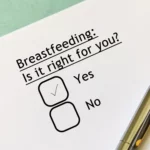You know that breast milk is the best food for your baby. But what about your own nutrition while breastfeeding? We asked a nutritionist a few questions about nutrition as a breastfeeding mom. Learn more about the Benefits of Breastfeeding.
During the breastfeeding period, it is not necessary to follow a special diet, the most important thing is that your diet is balanced. It should include plenty of fruits and vegetables, whole grains such as oats, and brown rice, various bowls of cereal, and bread marked “wholemeal”. These foods, along with potatoes, pasta, and couscous, are high in starch, an important source of energy.
You also need lean proteins, which are rich in chicken, eggs, legumes, lentils, fish, and lean beef, as well as healthy fats found in olive oil, nuts, seeds, avocados, and fatty fish such as salmon and mackerel. Fatty fish is very good for your baby’s health and development, but you should not consume more than two servings a week (about 140 g), as it may contain harmful impurities.
Do I need to take vitamins when breastfeeding?
The most important one is vitamin D. It is essential for bone health, for you and your baby. We get most of this vitamin from the sun. If you live in a region where there is not enough sunshine, especially in winter, your body may not get enough. In this case, your doctor may recommend taking extra vitamin D.
You should also get enough calcium because this is excreted during breastfeeding. Try to eat four servings a day of food rich in this mineral. These can be dairy products like milk, yogurt, and cheese, or non-dairy products like nuts, tofu, sesame seeds, and leafy vegetables. One serving can consist of, for example, half a cup of green vegetables or a small piece of cheese (50 g).
What foods should I avoid when breastfeeding?
The good news is that you can eat almost any food while breastfeeding. You should only limit the consumption of fatty fish. Even caffeine is acceptable in small quantities – more about this below.
If you are not allergic to peanuts, there is no reason to deny yourself the products in which it is included. Recent studies show that if you eat peanuts while breastfeeding and gradually introduce them to your baby’s diet during the first year, you will reduce the likelihood of your baby having a peanut allergy in the future.
Do I need extra calories while breastfeeding?
Breastfeeding moms need about 500 more calories a day for nutrition during breastfeeding. But every mom is unique, and your energy needs will vary throughout the breastfeeding period. The number of calories you need depends on your baby’s age, appetite, height, and weight, as well as your body mass index (BMI), your activity, and factors such as whether or not you are exclusively breastfeeding and whether or not you are feeding twins or multiple babies.
Can I go on a diet while breastfeeding?
Trying to lose extra weight while breastfeeding is not a good idea, because you need to get enough nutrients for you and your baby. The fat accumulated during pregnancy is used to produce milk, so breastfeeding on its own will help you get rid of the extra pounds.
If your weight changes by more than 1 kg per week, check whether you are eating a healthy and balanced diet, and adjust it if necessary. You can also ask your doctor for advice.
Should I drink more water while breastfeeding?
Breastfeeding can make you thirsty, so it is important to drink enough water. A person needs six to eight glasses a day, and even more when breastfeeding. Make it a habit to drink a glass of water, milk, or sugar-free fruit juice every time you breastfeed your baby.
I love coffee. Do I have to give up caffeine?

Coffee, like all foods you eat or drink, gets into your breast milk, so it is advisable to limit its intake while breastfeeding. Official allowances for coffee vary from country to country, but on average it is recommended not to exceed 200 to 300 mg of caffeine per day (300 mg is equivalent to two cups of filtered coffee or four cups of tea). Talk to your doctor about the amount of coffee you can consume. Keep in mind that caffeine is also found in cola and energy drinks, and a small bar of dark chocolate can contain up to 50 mg.
If I eat a variety of foods, will my baby be less picky?
Breast milk carries the taste of all the foods you eat. So if you eat a variety of foods in nutrition during breastfeeding, letting your baby try different flavors, he may like them in the future.
If you like spicy or spicy foods, there is no reason to give them up while breastfeeding. When my first baby was born, I ate a lot of spicy foods. When my daughter was two, we went to Sri Lanka, coincidence or not, she ate absolutely everything.
Could something in my diet nutrition during breastfeeding be wrong with my baby?
Young babies often suffer from colic or are fussy about food, so moms naturally wonder if it’s caused by their diet. Chances are, it’s not. Studies show that babies with allergies to components of breast milk are only a little over 1 percent. Cow’s milk, eggs, corn, and soy proteins in moms’ diets are much more likely to cause allergic reactions than the spicy foods, hot sauces, or cruciferous vegetables that moms usually worry about.
If your baby is allergic to substances in your milk, it can cause profuse vomiting, rashes, feces with blood, or prolonged constipation. If your baby is intolerant to a product, you will notice symptoms such as crankiness and crying after feeding, burping, and diarrhea or your baby will clench his or her knees to the breast. Talk to your doctor if something is bothering you. He may suggest excluding certain foods for a couple of weeks, and then see if the child’s behavior changes when he eats them again.
You may also want to keep a food diary: write down everything you eat and drink, as well as the symptoms your child is experiencing, and you may notice some patterns. However, before excluding any foods, such as dairy, always consult your doctor, as it is important to know that you will get the necessary nutrients from other sources. Depending on where you live, you will be referred to a nutritionist or other specialist.
Does a vegetarian diet affect breast milk?
If you get enough calories and all the nutrients your body needs (carbohydrates, proteins, fats, vitamins, and minerals), you have nothing to worry about. A vegetarian or vegan diet during breastfeeding needs plenty of vitamin B12, vitamin D, calcium, and omega-3 fatty acids, so give preference to foods and supplements that will provide you with these essential substances.
When following a vegetarian, vegan, macrobiotic, or other special diet, you may need to consult your doctor further to make sure you are getting all the nutrients your baby needs.






